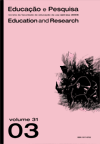Education, human development and cosmos
DOI:
https://doi.org/10.1590/S1517-97022005000300003Keywords:
Human formation, Development, Humanist pedagogyAbstract
This article seeks to analyze the process of human formation and development. It takes as a point of departure concepts of the humanist pedagogy, and tries to move forwards in the reflection upon these processes. The text attempts to demonstrate that this approach explains these processes in an interactionist, global and holistic way. Its main reflections are based on the thought of Carl Rogers, Jean-Jacques Rousseau, and John Dewey, trying to recall important contributions from these thinkers to the study of human development. Next, the paper seeks to show to need to overcome some contradictions in the ideas of these authors, an attitude required to deepen an interactionist understanding of the issue. Perhaps the main contradiction in these authors, shared with a considerable fraction of anti-authoritarian pedagogies, lies in the oscillation between innatism and interactionism. Despite the high value of these pedagogies to the establishment of radically democratic proposals of education and society, the text tries to demonstrate the need to overcome the above mentioned contradiction in order to move forwards in this field. By radicalizing interactionism we can exercise a complex understanding of the human being, seeing it simultaneously as an affective, political and cosmic being. The human organism is thus understood in its internal unity, in its social belonging, and in its connection with the cosmos, dimensions indispensable to a non-fragmentary vision of human development.Downloads
Download data is not yet available.
Downloads
Published
2005-12-01
Issue
Section
Articles
License
Authors assume exclusive responsibility for the concepts expressed in their articles, which do not necessarily reflect the journal’s opinion.
Permission to photocopy all or part of the material published in the journal is granted provided that the original source of publication be assigned.
How to Cite
Education, human development and cosmos . (2005). Educação E Pesquisa, 31(3), 363-377. https://doi.org/10.1590/S1517-97022005000300003



